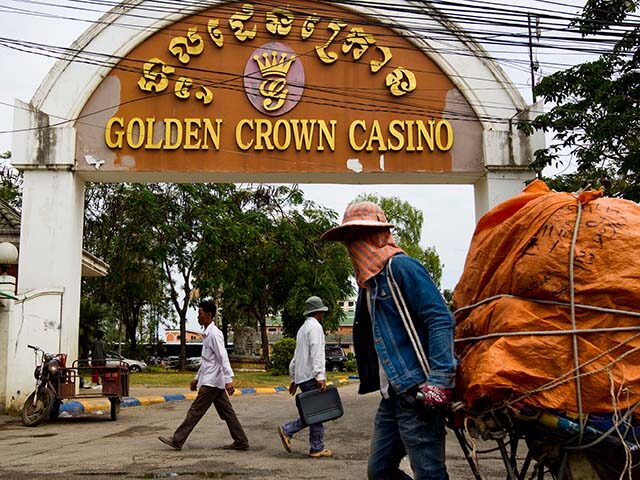The United Nations Office of Drugs and Crime (UNODC) released a report on Monday that accused North Korean state-controlled hackers of sharing their shadowy banking and money-laundering networks with scam artists and drug traffickers across Southeast Asia, including Myanmar, Thailand, Laos, and Cambodia.
The report, titled Casinos, Money Laundering, Underground Banking, and Transnational Organized Crime in East and Southeast Asia: A Hidden and Accelerating Threat, said the rapid evolution of organized crime in the region was originally propelled by “cross-border trafficking of synthetic drugs and other commodities,” but lately the gangs have embraced high technology and digital financial crimes.
Online casinos have proven especially useful to this end, especially those perched in “autonomous areas and Special Economic Zones or SEZs across the region that, in some instances, have become safe havens and breeding grounds for criminal networks.”
As the amount of revenue surging through criminal networks increased, gangsters developed an urgent need for “systems and infrastructure capable of moving and laundering massive volumes of state-backed fiat and cryptocurrencies.”
According to UNODC’s investigators, a North Korean hacking group called Lazarus, reportedly controlled by the main intelligence agency of the paranoid Communist state, stepped forward to provide access to such infrastructure.
Lazarus has been operational for at least a decade, with three massive headline-grabbing cybercrimes to its credit: the hack of Sony Pictures in 2014, launched in response to Sony producing a comedy about the assassination of North Korean dictator Kim Jong-un; an $81 million heist from the Central Bank of Bangladesh in 2016; and the WannaCry ransomware attack of 2017.
Lazarus puts a high priority on stealing money to finance the heavily sanctioned North Korean regime. WannaCry infected hundreds of thousands of computer systems around the world and many of its victims chose to pay the cryptocurrency ransom demanded by the hackers to unlock their imprisoned data. Capers like the Bangladesh heist allowed the hackers to loot millions in foreign currency. Lazarus pulled another big job in September, looting $41 million from an online casino platform called Stake.com.
The Lazarus Group reportedly developed techniques for using shady casinos and junkets (custom gambling trips for high rollers arranged by independent contractors) in Southeast Asia to erase the paper trail for their stolen millions.
In the Mekong Delta region, junket operators are often subjected to far less regulatory scrutiny than casinos – which are not subjected to all that much scrutiny to begin with – so Lazarus and its cronies reportedly developed schemes for mingling junket and casino funds. The hackers could inject stolen money into the junkets, which would then rinse the funds through casino chips, making it all but impossible for international law enforcement to follow the money trail.
UNODC saw evidence that Lazarus passed these techniques, along with access to some of their favorite money laundering operators, to drug gangs and online scammers.
“Through ongoing analysis of case information and blockchain data, UNODC has observed several examples of regional money laundering and underground banking networks benign shared between Mekong-based cyberfraud operators, drug traffickers, and more sophisticated cyber threat actors, including the Lazarus Group,” the report said.
The International Crisis Group (ICG) in August described areas in Myanmar and Laos clustered around the Mekong River as a “contiguous zone of vibrant criminality” and entrenched political corruption, which makes investigating well-connected organized crime rings difficult. Gangs in the region enjoy a general attitude of helpful neglect from China, which could crack down much harder if it wanted to, but responds “only when it considers its national interests under direct threat.”
Cyberfraud operations in Southeast Asia have recently drawn attention from human rights activists because a sizable number of the people making scam phone calls and hammering out phishing emails are actually slaves, in some cases literally chained to their desks. Many of them are young university graduates, lured from high-trust Asian societies with phony promises of employment and abducted into sweatshops when they show up for their job interviews.
“Too often, these people, even if they are rescued or able to escape, are held on immigration offenses or charged for the crimes they were forced to commit,” ICG noted.
UNODC’s report mentioned one human trafficking ring that specialized in luring young Taiwanese to Cambodia with the promise of professional employment, only to confine them in “prison-like conditions upon arrival” and force them to participate in cybercrimes. The group employed a professional travel agent to “help procure passports, order air tickets, and arrange transport” for the victims, and even give them tips for getting past Cambodian customs.
UNODC Regional Representative for Southeast Asia and the Pacific Jeremy Douglas told Reuters on Monday that casinos and cryptocurrency have “supercharged” organized crime in Southeast Asia.
“It’s no surprise sophisticated threat actors would look to leverage the same underground banking systems and service providers,” Douglas said.
Reuters contacted North Korea’s mission to the United Nations to ask about the UNODC report. The unidentified individual who responded said he was “not familiar with the issue,” and claimed stories about the Lazarus Group are “all speculation and misinformation.”
North Korea’s links to hackers and organized crime may disturb U.N. investigators, but North Korea’s new best friends in Russia remain untroubled. The Kremlin said on Monday it is developing even closer relations with “our partner” in Pyongyang, building on agreements reached when Kim Jong-un met with Russian President Vladimir Putin at the Vostochny space launch facility in Russia last year.
“Dialogue at all levels will continue. We look forward to intense and fruitful negotiations,” said Kremlin spokesman Dmitry Peskov. According to American and Ukrainian officials, one aspect of this intense and fruitful relationship is North Korea supplying Russia with missiles and artillery shells for use in its invasion of Ukraine.

COMMENTS
Please let us know if you're having issues with commenting.